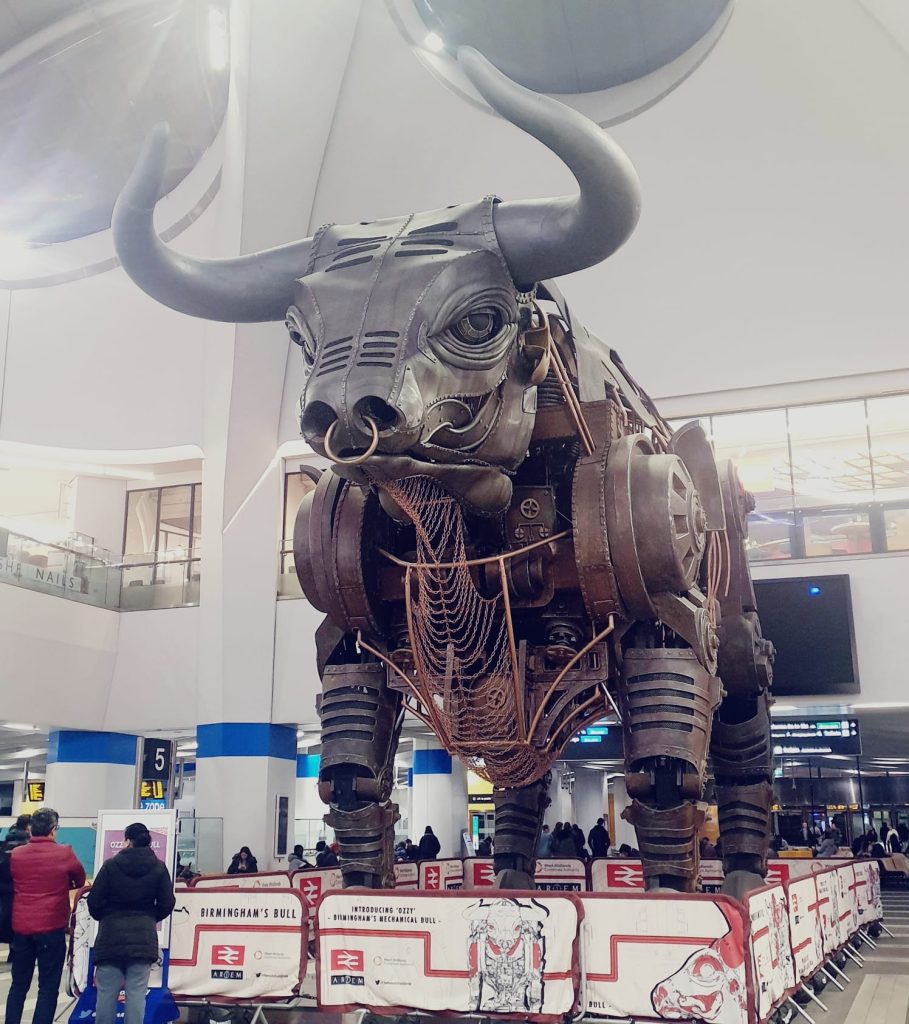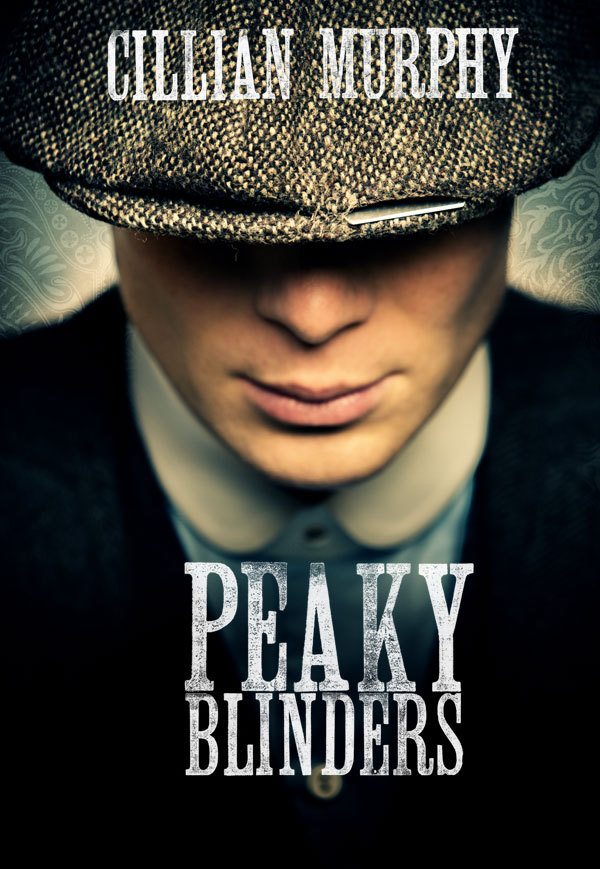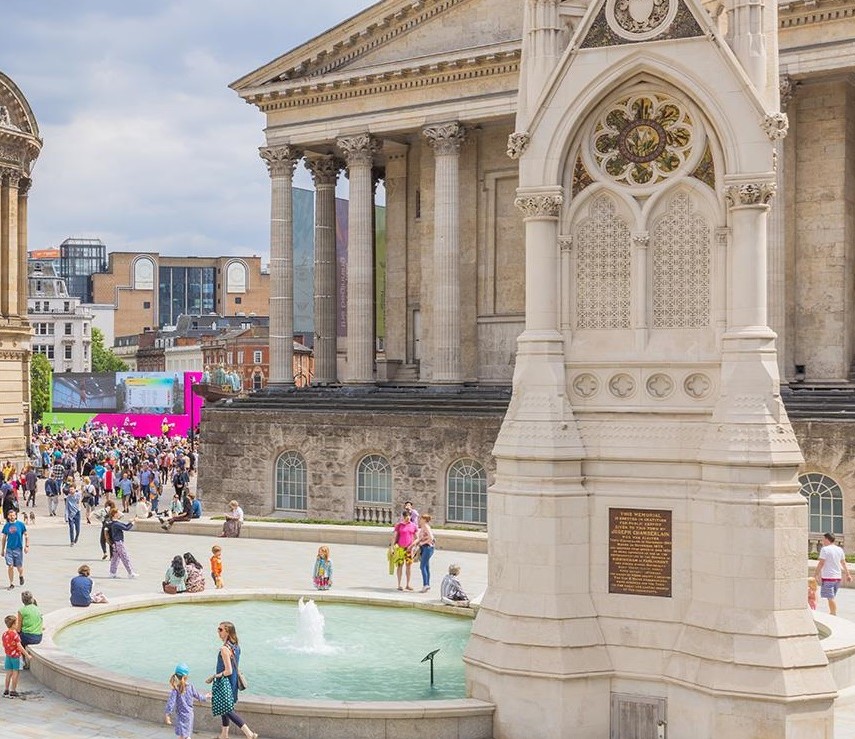We are delighted that Birmingham, UK – affectionately known as “Brum”! – will be hosting History of Games 2024, and this page highlights some key facts and places of interest that you may wish to explore during your stay.
Further down the page we have selected some useful resources and highlighted some key “things to do” while you’re staying in Birmingham!
Discover the Heart and History of the Second City
Birmingham is the second largest city in the UK and a cultural powerhouse.
From its rich industrial heritage to its dynamic contemporary scene, Birmingham offers a wide variety of experiences waiting to be experienced. Whether you’re exploring its canals, immersing yourself in its cultural offerings, or simply enjoying its vibrant atmosphere, we believe there’s something for everyone in this dynamic city.
Birmingham has a rich history, rooted in the Industrial Revolution. It is known for its factories, manufacturing, printmaking and as the place the Watt steam engine was invented. The oldest working engine in the world is the Smethwick Engine, which can be viewed at the ThinkTank Museum – next door to our venue!
The city’s resilience during events like the Birmingham Blitz of World War II also makes up part of its history – between August 1940 and July 1942, Birmingham suffered a series of raids.
Cultural Icons and Media Sector
Birmingham has a large number of cultural icons associated with it. From radical political leaders Thomas Attwood and Joseph Chamberlain, to musical legends Black Sabbath, ELO, and Judas Priest.
J.R.R. Tolkien, author of “The Lord of the Rings” trilogy, grew up in Kings Heath, and for any keen walkers visiting there’s a Tolkien Trail that takes visitors to landmarks that supposedly inspired his work, though it may take you out of the city centre itself.
You might also wish to visit the Jewellery Quarter, home to over a hundred jewellery shops, designers, and craftsmen. All That Glitters: Britain’s Next Jewellery Star, a BBC reality show that sees people compete in jewellery creation, was filmed there. Birmingham is also host to a range of other media venues – you can explore the Mailbox, which houses BBC Birmingham studios and was once the site of Pebble Mill Studios. Peaky Blinders, the British period crime drama starring Cillian Murphy, was also set in Birmingham. Although filming took place across the UK, some key scenes were filmed in the city.
A Tapestry of Diversity
Birmingham’s cultural landscape is diverse and dynamic. There are a range of performance groups, including the City of Birmingham Symphony Orchestra and the Birmingham Royal Ballet, and venues, including The Hippodrome and The Alexandra. Explore the Custard Factory in Digbeth, where modern art meets industrial history.
Digbeth is a 20 minute walk from the conference venue and is also home to board game cafe Chance and Counters, videogame arcade NQ64, and The Mockingbird independent Cinema.
Additionally, Birmingham was home to the 2022 Commonwealth Games, the largest event ever to be staged in the West Midlands region.
Iconic Landmarks and Hidden Gems
From Birmingham Cathedral to Grand Central, the city boasts a mix of historic landmarks and modern marvels. You can explore Chamberlain Square, home to the Chamberlain Memorial Fountain, and take a stroll along the Birmingham Canals, which are said to outnumber those in Venice. Don’t miss the Bullring Shopping Centre featuring the iconic Selfridges building – just outside you will find the “Original” Bull: the original symbol of Birmingham in association with the Bullring. The striking architecture of the Library of Birmingham is also not to be missed – situated next to Birmingham Repertory Theatre and Birmingham Symphony Hall.
Additional places of interest:
Grand Central: Newly built station, now somewhat becoming the heart of train transport in Birmingham – both a train station, shopping centre and food court.
Birmingham Cathedral and Cathedral Square: A baroque style church from the Georgian era.
Council House: Where the local elected government is located.
Victoria Square: Home to Town Hall and Council House, named after Queen Victoria.
Birmingham Town Hall: A historic venue for concerts and events.
Library of Birmingham: Definitely a point of interest due to its design.
Birmingham Canals: Scattered throughout the city and beyond, offering a nice stroll through Gas Street Basin.
The Roundhouse: Known for its distinct horseshoe shape design and part of Birmingham’s Victorian past; originally used as stables and stores.
Ozzy the “Raging Bull” in Grand Central: Designed as an homage to Birmingham’s industrial/factory past, named from a public poll after the famed Black Sabbath singer, Ozzy Osbourne.
Old Joe on University of Birmingham’s campus (Joseph Chamberlain Memorial Clock Tower): Though not directly in the city, easily accessed via a short train journey.
St Martin’s Church in the Bull Ring.
Hurst Street is known for being home to Birmingham Gay Village, and Birmingham Pride takes place at the end of May for anyone still in the city after the conference has ended!
Things to do
Daytime Activities:
- Sutton Park – Park Road, Sutton Coldfield, B73 6BT
- Library of Birmingham – Library of Birmingham, Centenary Square, Broad Street, Birmingham, B1 2ND
- Mockingbird Cinema – Mockingbird House, The Custard Factory, Gibb St, Deritend, Birmingham B9 4AA
- ThinkTank Birmingham Science Museum – Millennium Point, Curzon St, Birmingham B4 7XG
- Aston Villa Football Club – Villa Park, Birmingham B6 6HE – can book tours in advance –
- Birmingham Wildlife Conservation Park – Pershore Rd, Birmingham B5 7RL – can book in advance
- Cannon Hill Park – Russell Rd, Moseley, Birmingham B13 8RD
- Cadbury World – 69 Linden Road, Birmingham, West Midlands, B30 1JR – can book in advance –
- Warwick Castle – Castle Hill, Warwick, Warwickshire, CV34 4QU
- Aston Hall – Trinity Road, Aston, Birmingham, West Midlands, B6 6JD – can book in advance
- National SEA LIFE Centre Birmingham – The Waters Edge, Birmingham, West Midlands, B1 2HL – can book tickets in advance
Music/Performances:
- B:Music – what’s on for 21st May – 25th May – [ticketed events to book, some may be free]
- The Alexandra – Suffolk Street Queensway, Birmingham, West Midlands, B5 4DS –
- Birmingham Hippodrome – Hurst St, Southside, Birmingham B5 4TB –
Canal Walks (includes maps):
- General Canal Navigations sites –
City (Walking) Tours:
- City Sights & History (afternoon) tour – varies in price
- Birmingham Walking Tours
Travel Links:
- Birmingham City Centre Map (PDF)
- Birmingham City Centre Waterways Map (PDF)
- West Midlands Railway Network Map (PDF)
- London Northwestern Network Map (PDF)
Travel Guides [from Visit Birmingham] [includes also general information about Birmingham, places of interest, a few maps etc. for tourist interest]:
- Birmingham and the West Midlands Travel Trade Guide
- Dig Digbeth – The Essential Guide to Birmingham’s Creative Quarter (PDF)
- Shopping in the Jewellery Quarter The Essential Guide (PDF)
- Jewellery Quarter Food & Drink Guide (PDF)
- Jewellery Quarter Ale Trail (PDF)
- Jewellery Quarter Heritage Trail (PDF)

Ozzy the Raging Bull


